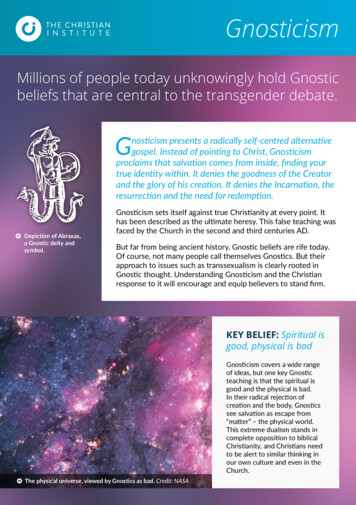
Transcription
GnosticismMillions of people today unknowingly hold Gnosticbeliefs that are central to the transgender debate.Gnosticism presents a radically self-centred alternativegospel. Instead of pointing to Christ, Gnosticismproclaims that salvation comes from inside, finding yourtrue identity within. It denies the goodness of the Creatorand the glory of his creation. It denies the Incarnation, theresurrection and the need for redemption. Depiction of Abraxas,a Gnostic deity andsymbol.Gnosticism sets itself against true Christianity at every point. Ithas been described as the ultimate heresy. This false teaching wasfaced by the Church in the second and third centuries AD.But far from being ancient history, Gnostic beliefs are rife today.Of course, not many people call themselves Gnostics. But theirapproach to issues such as transsexualism is clearly rooted inGnostic thought. Understanding Gnosticism and the Christianresponse to it will encourage and equip believers to stand firm.KEY BELIEF: Spiritual isgood, physical is badGnosticism covers a wide rangeof ideas, but one key Gnosticteaching is that the spiritual isgood and the physical is bad.In their radical rejection ofcreation and the body, Gnosticssee salvation as escape from“matter” – the physical world.This extreme dualism stands incomplete opposition to biblicalChristianity, and Christians needto be alert to similar thinking inour own culture and even in theChurch. The physical universe, viewed by Gnostics as bad. Credit: NASA
What are Gnostic beliefs?CreationGNOSTICS:CREATOR IS BAD SOCREATION IS BADThe physical world is “a mistake”, the work of abad or stupid god, the Demiurge, who is muchfurther down the divine hierarchy than thesupreme being.1The Demiurge is the god of the Old Testamentand is to blame for making an evil world, full ofsuffering. The supreme god, however, is onlyinterested in the non-physical spiritual reality.2The visible world is bad or meaningless, andno wisdom or truth can be gleaned from it.3BIBLE: A GREAT GODMADE EVERYTHINGVERY GOODThere is only one God, and he is the Creator ofall things. After creating this world “very good”(Genesis 1:31), he is still intimately involved. Noteven a sparrow falls to the ground without him(Matthew 10:29).Since the Fall the world has been beset bysuffering and evil – even creation groans underthe curse (Romans 8:22). But the source of thisevil is man’s sinful rebellion against God, not thephysical world itself.God sustains the world in his common grace,and creation still displays his glory (Psalm 19:1).God’s power, wisdom and beauty are clearlyperceived in the things that are made (Romans1:20).The Christian’s future hope is physical as wellas spiritual: one day God will usher in the newheaven and the new earth (2 Peter 3:13).Church Fathers taking on the GnosticsIgnatius: (c. 35-108)I want to forewarn you not to getsnagged on the hooks of worthlessopinions but instead to be fully convincedabout the birth and the suffering and theresurrection [of Christ] ”.4Irenaeus: (c. 130-202)These men. overthrow thefaith of many, by drawingthem away, under a pretence ofknowledge, from Him who foundedand adorned the universe”.6Justin Martyr: (c. 100-165)These persons seem to beignorant of the whole work ofGod, both of the genesis andformation of man at the first, and whythe things in the world were made”.5Tertullian: (c. 155-240)Now, if His death be denied, becauseof the denial of His flesh, there willbe no certainty of His resurrection.Similarly, if Christ’s resurrection benullified, ours also is destroyed.”7
The bodyGNOSTICS: YOU ARENOT YOUR BODYThe body is part of the material world, so is“contemptible”.8 It is a worthless shell, whichimprisons the true self – the “precious” spiritwithin.9 The human spirit is a ‘divine spark’ froma greater divine being than the Demiurge.10Someone’s ‘inner person’ is separate from andmore real than their physical body.Rejection of the body can lead toone of two extremes: eitherstrict asceticism, avoiding‘contamination’ with thephysical, or reckless hedonism,seeing no point in keepingthe body pure.11BIBLE: YOU ARE BODYAND SOULOur bodies are intrinsic to us, and are designedin wisdom and love by our good Creator, toserve and glorify him. We are “fearfully andwonderfully made” (Psalm 139:14).Yes, sin has tragically brought illness anddeath (Romans 5:12). But bodily life itself isnothing to be ashamed of. The believer’s bodyis “a temple of the Holy Spirit”, and we honourGod with our bodies by living in obedience tohim (1 Corinthians 6:19; Philippians 1:20).And far from being a useless shell, thebodies of believers will be raised again tonew life forever (1 Corinthians 15).Men and womenGNOSTICS: MALEFEMALE DISTINCTIONIS A CORRUPTIONThe distinction between men and womenshould be rejected because it is part of theuseless creation order. The ideal is androgyny– a synthesis of male and female, and soneither one nor the other.12The outworking of this ranges fromgoddess worship to saying women need tobecome men to be saved.13 But the commontheme is seeing the male-female distinction asdefective, part of the fallen world of death; wemust escape it if we are to find true life.14“When you make the male and the femaleone and the same, so that the male notbe male nor the female female thenyou will enter the kingdom.”Gnostic gospel of Thomas15BIBLE: MALE-FEMALEDISTINCTION IS GOD’SGOOD DESIGNGenesis 1:27 says: “in the image of God hecreated him; male and female he created them”.God deliberately made men and women asdifferent and interdependent. They are equal,but not the same: each sex has its own distinctrole to play in God’s design for family, society,and church.
Implications of a Gnostic view of the bodyGENDER IDENTITYSince ‘the real you’ is whatyou feel deep inside, the‘inner person’ overrides allexternal factors – includingobjective biological reality.So the transgendermovement claims that‘gender identity’ doesn’tnecessarily align with birthsex. A person can lookwithin to ‘write their ownscript’ – whether that’s male,female or some other option– regardless of their body.But God in his wisdomcreated mankind male andfemale, body and soul.Sexual identity is writteninto every cell in our bodiesas part of his creationdesign. Our bodies areintrinsic to who we are andin reality there is no suchthing as ‘gender identity’separate to biological sex.HUMAN VALUEIf a living human body is insignificant and onlythe ‘inner person’ is valuable, the sanctity ofhuman life is on shaky ground. Human worthwould then depend on something ‘within’,such as self-awareness or knowledge.Often today’s medical ethics assumesthat a human being starts and stops being a‘full person’ based on mental capacity. So theunborn child is regarded as not yet a personand the individual with advanced dementiamay be viewed as no longer a person.But human life is uniquely precious ascreated in God’s image. Our significancederives from this, not from our ‘quality of life’,age or capability. In Psalm 139 David thoughtof himself as a person before birth, praisingGod who knit him together in his mother’swomb.MARRIAGEIn today’s society, marriage is defined byfeelings. The complementary natures of menand women are irrelevant. Marriage becomesa disembodied and subjective relationshipbetween any two (or more?) people. At itscore this is a Gnostic-like view, exaltingthe ‘inner self’ over physical reality.And it means that marriageis malleable, with same-sexmarriage being just one logical consequence.But God grounds marriage in his creation.It is defined as being between a man and awoman and forms the foundation for familyand society. Marriage is the framework withinwhich love can thrive and children can beraised. God also gives human marriageas a picture of the ultimate marriagebetween Christ and his Church.
ChristGNOSTICS: CHRISTNEITHER FULLY GODNOR TRULY HUMANChrist is just one heavenly being among manyothers.16 He was from the supreme god, butcertainly wasn’t equal with God. And Christwas not truly human.17 He may or may nothave had a physical body (a “container”18),but he certainly didn’t die on the cross or riseagain from the dead.19BIBLE: CHRIST IS FULLYGOD AND FULLY MANJesus Christ is eternal God – the Word whowas in the beginning, who was with Godand who was God (John 1:1). And Scripturereveals that 2,000 years ago he became fullyman.The Incarnation is at the heart of theChristian faith, making redemption possible.Jesus could only take our place if he wasa true and perfect man. He could only riseagain, overcoming the death that was due us,if he was Almighty God. In short only a Godman could bridge the gap between us andGod.“In the beginning was the Word, andthe Word was with God, and the Wordwas God. The Word became flesh ”John 1:1, 14aSalvationGNOSTICS: SALVATIONIS ESCAPING THE BODYWe are trapped in our bodies and the materialworld, so our fundamental need is to escapeinto the perfect, non-physical “essence”.20 Theresurrection is spiritual, not of the body.21The way to this salvation is enlightenment,affirming the divine spark within. Jesus is a‘revealer’, who gives knowledge (‘gnosis’) of ourtrue spiritual identity and divine origin.22 Thisgnosis equips the chosen few to return to therealm of light after death.23BIBLE: SALVATION ISFOR BOTH BODY ANDSOULEvery human being needs redemption from sin(Romans 3:23). By nature we are enemies of Godand slaves to sin – without hope (Romans 6:20;Ephesians 2:12).But our loving and wise Creator gave his Sonto save lost sinners. Jesus’ perfect life, sacrificialdeath and glorious resurrection won salvationfor all who put their trust in him (Romans 5:19;8:1). Salvation comes through faith in him, notfrom looking within ourselves.Scripture is clear that the result of faith is"the salvation of your souls" (1 Peter 1:9). Butsalvation is not only of our souls. Ultimately wewill be with Christ forever in a new creation withbodies like his glorious body (Philippians 3:21;Revelation 21-22).
GNOSTICISM: THE BACKGROUNDBy the middle of the secondcentury, Gnosticism wasa major challenge for theChurch.Gnostics’ radically differentbeliefs were a particular threatbecause they were wrappedin Christian language andclaimed to comprehensivelyanswer life's key questions.24Prominent Gnostic leaderswere Marcion (active c. AD140-160), Valentinus (activec. AD 117-138) and Basilides(active c. AD 137-154).25The Early Church’sresponse was in large partled by Irenaeus, bishop ofLyons (c. AD 130-202).26While Gnosticism was thrivingaround Lyons, Irenaeuspreached the true Gospel.With a pastor’s heart, he setout to slay the ‘many headedmonster’ that was subvertingthe message of Jesus Christand leading many astray.27His major work, AgainstHeresies, shows a thoroughknowledge of both the Bibleand the Gnostic beliefs hewas refuting. Until Gnostictexts were discovered at NagHammadi in Egypt in 1945, itwas one of the few sourcesabout Gnostic beliefs.28Tradition has it thatIrenaeus was martyred on 28June 202, but not before hewas used by God to critically Irenaeus led the responsewound Gnosticism.29One result of the Gnosticheresy was Christiansbecoming more careful tosafeguard apostolic teaching.The Early Church creedsbegin with God as Creatorof all things, emphasise theIncarnation and end with theresurrection of the body toeverlasting life.30GNOSTICISM IN POPULAR CULTUREGnosticism was successfully rejected by theEarly Church but never quite went away. It hasenjoyed a revival in today's popular culture, notleast in New Age thinking.31Dan Brown’s ‘Da Vinci Code’ suggests theGnostic gospels contain truth about Christ thata power-hungry church concealed.32 Gnosticideas also play a key role in the many films thatpromote finding ‘who you really are’ and ‘beingyourself’ as the path to true fulfilment.Alister McGrath explains that Gnostic themes“chime in with contemporary ideals of selfdiscovery, self-awareness, self-actualization, andself-salvation, not to mention a dislike of anykind of authority, especially ecclesiastical”.33“The only true Christians were theGnostics, who believe in self-knowledge,i.e. becoming Christ themselves, reachingthe Christ within ”.John Lennon34References available at STIANORGUKCHRISTIANORGUKRegistered office: The Christian Institute, Wilberforce House, 4 Park Road, Gosforth Business Park, Newcastle upon Tyne, NE12 8DGTel: 0191 281 5664 Fax: 0191 281 4272 Email: info@christian.org.uk Website: www.christian.org.uk Printed in November 2017Registered in England as a charity Charity No. 100 4774 Company No. 263 4440. A charity registered in Scotland Charity No. SC03922017GN01CHRISTIANINSTITUTE
Gnostic thought. Understanding Gnosticism and the Christian response to it will encourage and equip believers to stand firm. KEY BELIEF: Spiritual is good, physical is bad Gnosticism covers a wide range of ideas, but one key Gnostic teaching is that the spiritual is go


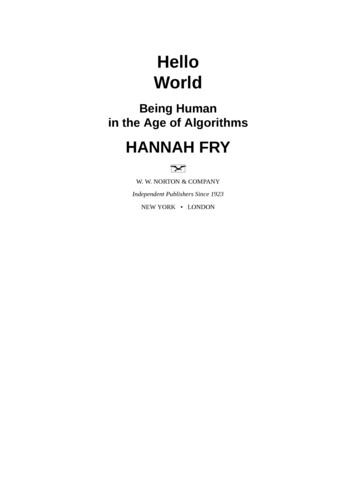
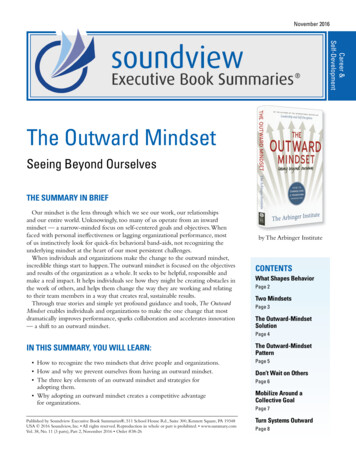

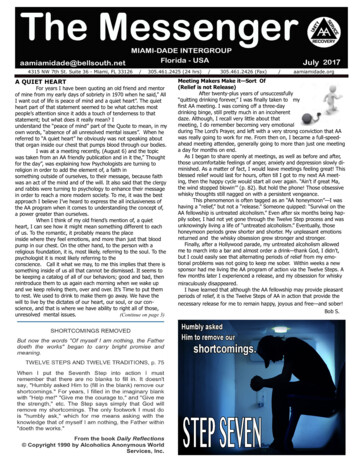
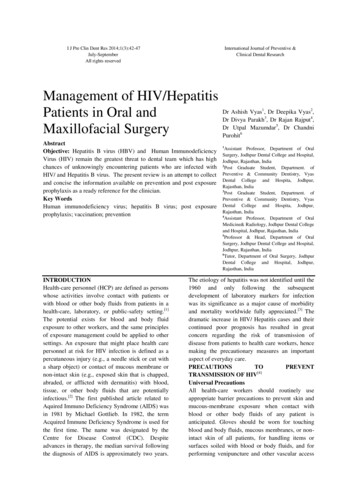
![NC controller 4-30-2014.pptx [Read-Only]](/img/31/pci-dss-security-awareness-training-ryan.jpg)


